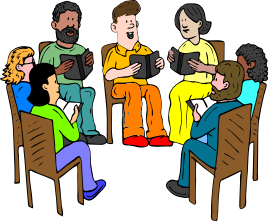In the golden 50’s or 60’s there had been the glory of reading books and analysis in campus adda or Sahitya Sava. It is now renovated through Google Search with wide spectrum in literary clubs. But now a day, academically such a glorious part of discussions is restricted upon literary conferences and academic dissertation where a few of the research scholars and guest teaching remain present. There had been hardly any fresh air albeit the thesis submission and obtains the degree.
However, it is not the whole situation. A few of the college and university regularly publish journals and paper for research scholars .And few of them has literary clubs too. They promote young talents towards the domain of creativity. Participants also receive awards and cash prizes. But the real aspect of adda or gossip in pure fun frolic with a lot of literary buzz is gradually letting down. This guide is designed for people who love to read, whether it for personal enjoyment or within a reading group. It includes information on books in general as well as specifics for book groups. This guide will provide users with resources about finding books to read, starting a book group and journaling your reading.
I have thoroughly searched the net and crafted a dozen of literary clubs online:
Goodread Book Club Link: http://www.goodreads.com/group
Women's Lives Club Link: http://amysmartgirls.com/be-a-part-of-the-smartest-new-book-club-wlclub/
Online Book Club Link: http://onlinebookclub.org/
My Book Club Link: https://www.my-bookclub.com/
BookTalk.org Link: http://www.booktalk.org/
New York Times Books Forum Link: http://www.nytimes.com/books/forums/
Open Directory: Arts: Literature: Reading Groups List Link: http://dmoz.org/Arts/Literature/Reading_Groups/
BookReporter.com http://www.bookreporter.com/
The New York Times Book Section Link: http://www.nytimes.com/pages/books/
Bibliomania http://www.bibliomania.com/bibliomania-static/
Classic Bookshelf Electronic Library Link: http://www.classicbookshelf.com/library/
University of Pennsylvania Link: http://digital.library.upenn.edu/books/
All these clubs are online and digital exchange of words of mouth is done there. But their physical locations are not truly identified or of much use. More than that, these are run by literary enthusiast and a real complimentary to studies. Most of these sites promote quality books, good peoples and great conversations. Readers are invited to join in reading and discussing on variety of books. Online forums are found within a variety of subjects including feature discussions, author discussions, or even sometimes the monthly selected book discussion. This Reading Groups often contains links to many reading groups online. Readers of same interest or specialized audiences lead these discussions into further lighting up of the subject.
Many of the listed links of groups of clubs provide a variety of resources including book lists, reviews, awards, discussion and links to other book related sites. Luckily, most of these sites aim to thoughtful book reviews, compelling features, in-depth author profiles and interviews, plus excerpts of the hottest new releases, literary games and contests. A literature enthusiastic must use these sites to search book reviews, read about the latest releases, watch author video clips, and learn about upcoming book events.
Before you start discussions better start reading e-books online. Make Google Search for old classics or new releases @
Apart from these, there are dozens of Facebook pages and Google pages and communities list.
From history books we have learned the Young Bengal, Kollol poets, Oxford movement, Edinburgh literary circle, but such scholarly literary enterprising is missing now a days. Exchange of views with the motto of learning and teaching can pave these ways. Any college or university or high school can set up such literacy circle on any national and international literary personage. We can set up a literary adda/group/committees/club in physical location by keeping in mind these follows instruction:
- Fixation of Dates: weekly / monthly / Bi-annually
- Crafting a board / body – including the members from interested different set of life
- Recording the discussion / digitally and print version
- Publication through journals of periodicals (commercially / non-profit). I can’t understand why ISSN should be on non-profit?Applying grant / donation etc
Ardhendu De


Comments
Post a Comment
Drop any query, suggestion or comment here.